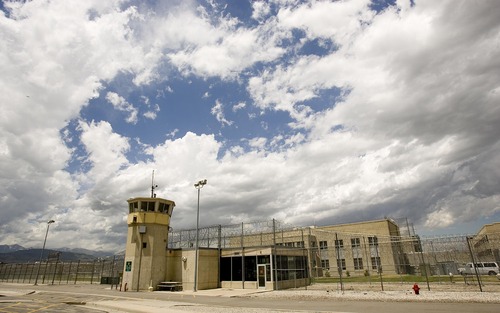This is an archived article that was published on sltrib.com in 2014, and information in the article may be outdated. It is provided only for personal research purposes and may not be reprinted.
Utah's new prison will have to be big, high-tech and convenient, lawmakers said Thursday — not to mention environmentally harmless and publicly accepted.
It's a tall order for an undertaking that one legislator called "the biggest issue the state will be dealing with over the next few years."
In a presentation Thursday to the state's Prison Relocation Commission, consultants discussed the impact and possibilities of moving the Utah State Prison from its 700-acre property along Draper's high-tech corridor known as "Silicon Slopes," where the facility currently sits, to another — so far undetermined — location in the state.
The move itself will run a price tag of about $1 billion, the consulting group MGT of America, Inc., told legislators. But, they said, the state will pay nearly as much —$783 million — to keep the Draper prison up and running for the next 20 years.
That facility, which was established more than 60 years ago to accommodate 487 inmates, is "falling apart" said Sen. Jerry Stevenson, R-Layton.
"We need to move forward," Stevenson said. "[Moving the prison] is something that needs to be done and needs to be done quickly."
Members of the Prison Relocation Commission hope to have concrete recommendations on possible new prison sites and how much the move will ultimately cost to deliver to lawmakers by the 2015 legislative session.
Among the criteria the state ought to look for in a new prison site, consultants said, are its proximity to courts and hospitals, accessibility by either public transportation or major highways, community interest and support.
A statewide poll taken two months ago indicated lukewarm support of the relocation project — 46 percent of those who participated voiced their support, while 33 percent were opposed and 21 percent were undecided — but lawmakers at Thursday's commission meeting said they've already been bombarded with calls and emails from eager Utahns who want to offer up land or make suggestions for the new prison.
Public lands would offer a more cost-effective solution than having to purchase privately owned property, said Bob Nardi, of the Lewis Burger Group, but the state should be open to any and all prospects given how much space would be needed to successfully build a new prison.
The public will also be invited to comment at future commission meetings, as public engagement is "an important part" of the relocation process, Nardi said.
"This is a very high-profile issue and one of the biggest issues the state will be dealing with over the next few years," said Rep. Brad Wilson, R-Kaysville, the House chair of the commission.
Utah's prisons have an emergency capacity of 7,225. Population projections indicate that Utah's prisons will outstrip that number by 2018.
That's the year the state should begin construction on its new prison, consultants said. If building takes three years, as predicted, a new facility would be up and running by 2021.
"We have an opportunity before us now to make changes," said Sen. Karen Mayne, D-Salt Lake. "Everything is going to be different."
Rollin Cook, the executive director of the Utah Department of Corrections, briefed the commission on the programs and facilities housed in the Draper prison and how those can be improved upon to better serve the prisoners, staff and state at large.
Among the recommendations Cook made were designated spaces for work training programs, education, mental health and substance abuse treatment and re-entry services.
"This is really about the people," Cook said. "It's an opportunity to make a significant impact on our criminal justice system."
Cook suggested making the prison — and its programs — more technologically advanced, which would include incorporating the use of tablets and e-books into daily prison life.
The commission will meet again on June 19 at 8 a.m. The consulting firm's final report is due to the Prison Relocation Commission by the first of June.
Twitter: @Marissa_Jae



